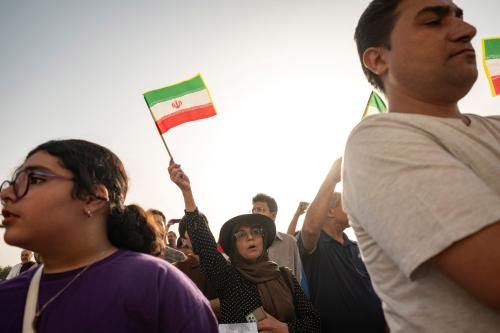Does the Bush administration know what it’s doing in the Middle East? Reading last week’s newspaper reports, one might have doubts. On Thursday, a team from the Palestinian Authority met in the White House with the national security adviser, Condoleezza Rice, and was photographed with Secretary of State Colin Powell. One member of this Palestinian team was the newly appointed interior minister, Abdel Razak Yehiyeh, the man given the Herculean task of reforming the Palestinian security services. It made sense to meet with him.
But why were the president’s most senior advisers also meeting with Saeb Erekat, the man appointed by Yasir Arafat to head this delegation? He is one of Mr. Arafat’s most loyal advisers, a full-fledged member of the Palestinian leadership that President Bush insisted, in his June 24 speech on the Israeli-Palestinian conflict, must be replaced. In meeting with Mr. Arafat’s emissary, the president’s advisers appear to be undermining the president’s declared intent.
On the other hand, Defense Secretary Donald Rumsfeld, in remarks on Tuesday, seemed deeply equivocal about a Palestinian state when he said that, in his lifetime, “there will be some sort of an entity that will be established.” This contradicts the president’s commitment, made on June 24, for the establishment of a Palestinian state within three years. President Bush reiterated that commitment while visiting with Arab foreign ministers on July 18 and again to Jordan’s King Abdullah when he visited the Oval Office on Aug. 1.
Mixed messages seem also to be the hallmark of the administration’s approach to Iraq. In the ongoing saga of publicizing the administration’s secret war plans, The Times has revealed that debate within the administration is evolving toward a “Baghdad first” option, intended to kill or isolate Saddam Hussein and force a quick disintegration of his regime. If that’s an accurate reflection of Mr. Bush’s war plan, why has it been leaked to the press? Even more perplexing, why does the administration seem so eager to announce its bold plans when such leaks put pressure on our Arab allies—Saudi Arabia, Jordan and Egypt—to distance themselves from us when we may soon need their cooperation in the coming war against Saddam Hussein? An egregious example of this contradiction occurred recently when someone associated with the Pentagon leaked a briefing paper branding Saudi Arabia an enemy of the United States.
At the same time, there has been hardly a word of criticism from the Bush administration of the Egyptian government’s recent sentencing of a leading democracy advocate to seven years of hard labor—despite Mr. Bush’s vocal support for democracy in the Arab world.
These contradictions might be explained and rationalized. But no amount of spinning can prevent their net effect, which is to undermine the administration’s credibility in the Middle East. Indeed, the randomness of American rhetoric on the Middle East is becoming its most distinctive pattern.
The progress of our diplomacy has been equally erratic. Secretary Powell announced in November 2001 that he was dispatching Gen. Anthony Zinni to the Mideast with instructions to stay in the region until he achieved a cease-fire—and withdrew him as soon as he faced the predictable campaign of terrorist attacks. General Zinni’s return to the region was then made contingent on the very cease-fire he was supposed to be helping the two sides to achieve.
After a spate of suicide bombings in May, the president announced that he was sending George Tenet, the director of central intelligence, to the Middle East to deal with the Palestinian terrorist problem, but Mr. Tenet did not go until a month later. Secretary Powell announced in early May a Middle East peace conference to be convened by early summer, an idea that was quietly shelved by late June. Finally, after weeks of internal wrangling, the president declared a bold vision of a democratic state in Palestine—but there is evidently no serious intention to follow through, especially in pushing for the all-important Palestinian security restructuring.
None of this would matter much if we were talking about policy toward Benin. But in the Middle East our vital interests in oil and Israel intersect with the war on terrorism. It is a region seething with anger toward the United States. Our credibility is essential to our effectiveness there. But the administration’s lack of coherence, and the widening gap between its rhetoric and its actions, are casting doubt on that credibility.
The Brookings Institution is committed to quality, independence, and impact.
We are supported by a diverse array of funders. In line with our values and policies, each Brookings publication represents the sole views of its author(s).



Commentary
Op-edA White House in Search of a Policy
August 11, 2002